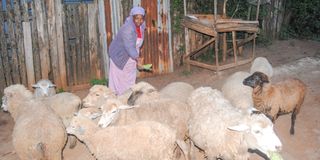Vet on call: Here’s why some acaricides don’t curb animal pests

Ruth Mumbi feeds her sheep at Mastima estate in Elburgon, Nakuru County. Ticks and fleas continue to give livestock farmers a big challenge.
What you need to know:
- The chemicals used to treat livestock against ticks and fleas are called acaricides because they kill ticks and mites, which belong to the scientific sub-class called acari.
- Most of the chemicals also kill fleas which belong to the class insects. Incidentally, not all acaricides also kill fleas.
- The washing technique and frequency of washing also determine the effectiveness of an acaricide. Animals should be washed once per week.
- In Kenya, studies have shown that pastoral communities have often been affected by Q-fever but the disease is mostly misdiagnosed or not detected.
Products for the control of external parasites on animals are ubiquitous in the Kenyan market. However, ticks and fleas continue to give livestock farmers a big challenge.
My article on the case of a lamb in Ruiru is still raising questions about the small blood thieves. Unfortunately, the lamb had lost most of its blood and died a week after treatment.
A post-mortem examination revealed an enlarged, weakened heart. I attributed this to the heavy loss of blood and damage to the heart caused by overworking. The organ was compensating in an attempt to pump the ever-diminishing blood volume.
The farmer was still surprised that such small creatures like fleas and ticks could suck dry the blood in a creature millions of times their size.
I told him it just demonstrates the mantra, “There is lots of money at the bottom of the pyramid”. The cumulative volume of each tiny quantity of blood sucked by one flea eventually approximates the total volume of blood in the poor lamb.
Kamau from Laikipia wanted to know whether ticks and fleas have other impacts on sheep apart from blood loss and the ensuing complications of anaemia.
He said he was not aware if ticks and fleas can spread other diseases to the sheep and people. He also said he washed his sheep and calves regularly but they still had fleas and ticks. “Could the parasites be resistance to the chemicals I use?” he wondered.
The chemicals used to treat livestock against ticks and fleas are called acaricides because they kill ticks and mites, which belong to the scientific sub-class called acari.
Products that are registered
Most of the chemicals also kill fleas which belong to the class insects. Incidentally, not all acaricides also kill fleas. The insects are resistant to Amitraz, one of the most commonly used acaricides in Kenya.
I confirmed with Kamau that the acaricide brand he had been using contained Amitraz. With that, he would never get rid of the fleas. I advised him to use a pyrethroid alternative.
There are other factors that may lead to acaricide failure. A farmer must always read the instructions on the dilution rate for each product to ensure they prepare a solution of the correct lethal strength.
Very weak solutions do not kill the parasites while too strong solutions may poison the animal. Farmers should enquire from their animal health service providers how to ensure the correct water to acaricide mixing ratio. From my experience, most farmers just estimate without measuring.
The washing technique and frequency of washing also determine the effectiveness of an acaricide. Animals should be washed once per week.
The whole body should be properly wetted down to the skin. Spraying, dipping, or pour-on are the best methods of external parasite control. Hand-washing has a high rate of failure due to inadequate skin coverage with the acaricide.
Acaricides may also fail due to poor quality. Farmers should buy products that are registered for use in the country.
Sometimes pests also develop resistance to acaricides that have been used continuously for a long time in the same area.
Farmers should report to their animal health service providers if they find acaricides that despite being used properly are not effective in killing parasites.
The service providers should in turn report to the Director of Veterinary Services for investigation.
Pastoral communities
Acaricides may also fail when animals are washed and then rained on. The rainwater leaches the acaricide from the animal’s skin and leaves it exposed to parasites. Animals should be washed and protected from the rain.
In addition to causing anaemia and death, ticks and fleas also transmit many diseases to livestock and humans.
In this case, ticks are more important than fleas. Ticks in the Northern Hemisphere including Europe and North America are known to transmit serious diseases such as Lyme, Q-fever, louping ill, and tularaemia to other animals and humans.
In Kenya, studies have shown that pastoral communities have often been affected by Q-fever but the disease is mostly misdiagnosed or not detected.
It is caused by a tick-transmitted bacterium called Coxiella burnetii. In animals it causes fever, late-term abortions, birth of weak offsprings and pneumonia.
The disease in humans causes fever, chills, nausea, vomiting, headache, stomach pains and diarrhoea. Other signs are chest pains, fatigue, dry cough, muscle pains and weight loss. Severe untreated cases may cause death.
The disease in both animals and humans can be treated over a long antibiotic course. Ticks also spread tularaemia, a bacterial infection caused by the bacterium Francisella tularensis.
The disease has not been reported in Kenya but recent studies by J. Njeru and others in the North-Eastern region found scientific evidence of its presence in some human patients with fever.





